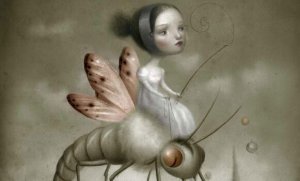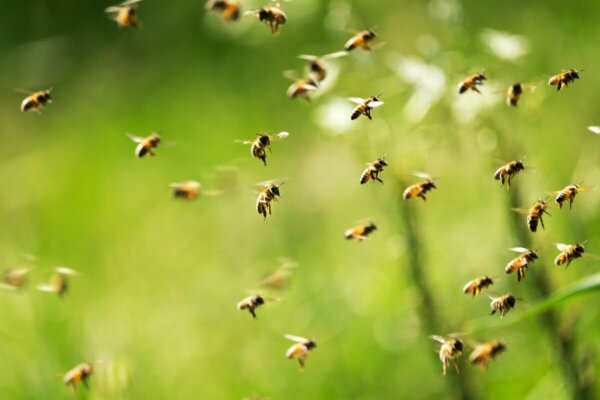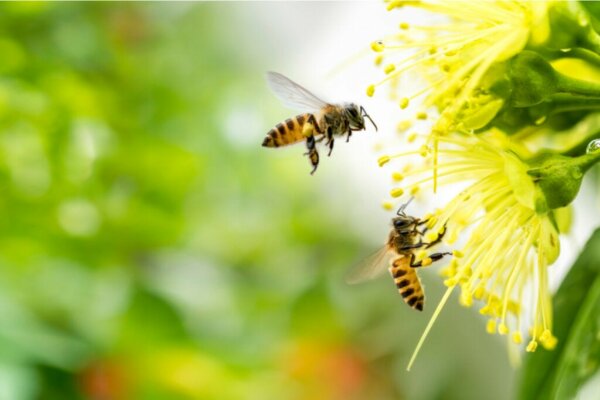Do Insects Have Cognition?

The barriers of anthropocentrism become more blurred with each new discovery about the animal mind. What started with dogs and rats is spreading more and more. Now we know that octopuses are extremely intelligent, dolphins talk, and insects have cognition.
That such small animals have intelligence is difficult to believe. That’s because this ability has always been directly associated with the size of the brain. However, one thing is certain. Social insects behave as a single organism. This is commonly known as the hive mind.
Would you like to know a little more about these walking neural nuclei? If so, the studies we’ll talk about in this article will certainly both interest and surprise you. Indeed, you surely wouldn’t have ever expected that those little specks you see on the ground or sucking nectar from the flowers, could lead such complex lives.

Do insects have cognition?
We already knew that insects feel pain and have basic emotions. However, now we know that they have cognition too. As a matter of fact, insects are usually the last in line to be recognized but luckily there are always certain researchers interested in their abilities.
At first, the size of insects’ brains seemed a clear indicator of their capabilities but, on looking closely, this isn’t the case. For example, an ant’s brain measures less than 0.06 cubic centimeters. Nevertheless, it’s highly specialized in smell. Furthermore, the axons of its neurons are supported by different glomeruli. Interconnected, they form the equivalent of the human cerebral cortex.
Here are several facts that have been discovered about cognition in insects. Some of them will surprise you.
Bumblebees use tools
The use of objects to achieve objectives was believed to be exclusive to human beings until just 20 years ago. Then, it was discovered that the great primates were also capable of using them. This was followed by marine mammals and birds. However, a study conducted in 2017 claimed that bumblebees were capable of this too.
In this study, the researchers trained the bumblebees to move small balls to the center of a platform in exchange for sugar water. As well as learning at an astonishing speed, the insects also taught it to their fellows. In fact, the success rate was much higher when the bumblebee learned from a peer than when the experimenters taught them.
Ants have expectations
Expectations, those fictitious results to a situation that hasn’t yet happened, are also not beyond the reach of insects. In fact, ants have shown that they’re capable of harboring them.
When presented with different concentrations of sugar, ants reacted with much more enthusiasm on discovering that the water was much sweeter than in previous tests. On the contrary, when they went from high to lower sugar concentrations, they were more erratic and didn’t have much interest in drinking the liquid.
Flies and classical conditioning
The fruit flies in this experiment were trained in two situations. In one, they were presented with an odor associated with the appearance of food. In the other, another smell was linked to an unpleasant vibration.
As expected, the odor associated with the vibration caused the flies not to approach the source of the odor, while they approached the one associated with the food. However, by presenting a mixture of the two odors, only the flies that previously suffered the unpleasant vibration were hesitant to approach.
Bees and caffeine
Bees have long been known for their incredible life and their ability to function as a hive mind. A study from 2021 was conducted to find out if, in addition to this, they were influenced by the stimulating effect of caffeine.
This substance is present in nature. Bees know this. In fact, they tend to choose citrus trees and the coffee plant itself, since caffeine is present in the nectar of its flowers. To find out if this molecule influences the memory capacity of bees, artificial flowers whose aroma contained caffeine were presented.
The results were revealing. Bees who were trained to associate artificial scent with caffeine chose these flowers much more frequently. On the contrary, those who weren’t trained chose the different options almost equally.

The circadian clock of pollinating insects
Another proof that insects have cognition is the incredible ability of bees to tell each other where the best flowers are by ‘dancing’. This has been one of the most exciting discoveries to date in science. However, it doesn’t stop there and neither does it stop with bees.
Pollinating insects (in general) tend to feed on flowers whose pattern varies predictably over time. These time-based preferences are linked to a circadian clock. In other words, they learn the specific time of flowering of the plant species in their surroundings and optimize their trips to make more efficient routes.
As you can see, insects may be small but they’re pretty complex. In fact, the biological distance between them and us is an extremely good way to study the fact that they have cognition. That’s because commonalities are discovered by differences. As a matter of fact, if you’re interested in these little inhabitants of our planet, you should continue investigating. Indeed, they’re animals that never cease to amaze.
All cited sources were thoroughly reviewed by our team to ensure their quality, reliability, currency, and validity. The bibliography of this article was considered reliable and of academic or scientific accuracy.
- Barron AB, Klein C. «What insects can tell us about the origins of consciousness». (2016) PNAS 113 (18) 4900-4908; DOI: 10.1073/pnas.1520084113.
- Deakin A, Mendl M, Browne WJ, Paul ES, Hodge JJL. «State-dependent judgement bias in Drosophila: evidence for evolutionarily primitive affective processes». (2018) Biology Letters. 14(2).
- Gibson WT, Gonzalez CR, Fernandez C, Ramasamy L, Tabachnik T, Du RR, Felsen PD, Maire MR, Perona P, Anderson DJ. «Behavioral responses to a repetitive visual threat stimulus express a persistent state of defensive arousal in Drosophila». (2015) Current Biology 25(11):1401-15.
- Wendt, S., Strunk, K. S., Heinze, J., Roider, A., & Czaczkes, T. J. (2019). Positive and negative incentive contrasts lead to relative value perception in ants. eLife, 8, e45450. https://doi.org/10.7554/eLife.45450
- Sarah E.J. Arnold et al. (2021) Bumble bees show an induced preference for flowers when primed with caffeinated nectar and a target floral odor. Current Biology, published online; doi: 10.1016/j.cub.2021.06.068
- Loukola, Olli & Perry, Clint & Coscos, Louie & Chittka, Lars. (2017). Bumblebees show cognitive flexibility by improving on an observed complex behavior. Science. 355. 833-836. 10.1126/science.aag2360
- de Ibarra, N. H., & Rands, S. (2021). Pollination: Influencing bee behaviour with caffeine. Current Biology, 31(18), R1090-R1092.
This text is provided for informational purposes only and does not replace consultation with a professional. If in doubt, consult your specialist.








